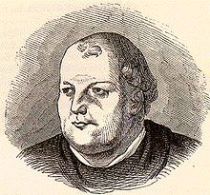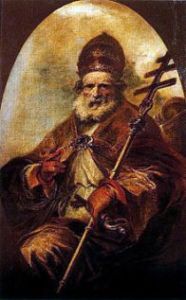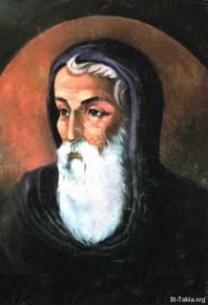
Tomorrow is Reformation Day, in which we commemorate the traditional start of the Protestant Reformation: Martin Luther nailing his Ninety-Five Theses to the Castle Church door in Wittenberg. However, it is crucial to note that there were forerunners of the Reformation in the late Middle Ages who to an extent laid a foundation from which the 16th Reformation built on. While there are quite a number of these forerunners, the two most well-known are John Wycliffe in England and Jan Hus of Bohemia (today’s Czech Republic).
Jan Hus (c. 1369-1415) would end up being burned at the stake for his ideas, which countered the ecclesiology and sacramentology (among other theological issues) of the Roman Church. Hus took up many of Wycliffe’s ideas and in the excerpt below, from his work De Ecclesia (On the Church) argues that Christ (and not the Pope) is the true and only head of the Church. The final condemnation of Hus on 6 July 1415 was based primarily on propositions derived from the aforementioned work. The same morning that Hus was burned at the stake a copy of this work was symbolically destroyed by fire. Martin Luther would later say of Hus, specifically in light of his opposition to the authority of extrascriptural canon law: “I have taught and held all the teachings of Jan Hus, but thus far did not know it. Johann von Staupitz [I’ll get to this guy in my next post] has taught it in the same unintentional way. In short we are all Hussites and did not know it. Even Paul and Augustine…”
The excerpt below is quite long (read it with patience) – it is the entire chapter 7 of Hus’ De Ecclesia:
CHAPTER VII
THE ROMAN PONTIFF AND THE CARDINALS NOT THE UNIVERSAL CHURCH
It has been said that Christ is the sole Head of the holy universal church and all the predestinate, past and future, are his mystical body and every one of them members of that body. It remains now briefly to examine whether the Roman church is that holy universal church, the bride of Christ. This seems to be the case because the holy catholic apostolic church is one, and this is none other than the Roman church. What seemed a matter of question is therefore true. The first part of the statement appears from Pope Boniface’s bull: “By the urgency of faith we are compelled to believe and hold that the holy catholic apostolic church is one.” Likewise, the second statement appears from the same decretal, which says: “Of the one and only church there is one body, one head, and not two heads like a monster, namely, Christ and Christ’s vicar, Peter, and Peter’s successors, even as, when the Lord said to Peter himself, ‘Feed my sheep,’ he spoke in a general sense, not of individuals, of these or those sheep. It is plain that he regarded all the sheep as committed to him. Therefore, if the Greeks and others say that they were not committed to Peter and his successors, they thereby confess that it is not necessary to be of Christ’s sheep; for did not the Lord say, in John: ‘They shall become one fold and one shepherd’?” Is it not evident, therefore, that the holy Roman church is that holy universal church, because all are Christ’s sheep, and the one fold is of one shepherd? This is the meaning of the aforesaid decretal of Boniface, which closes with these words: “Further we declare, say and determine that to be subject to the Roman pontiff is for every human being altogether necessary for salvation”—subesse Romano pontifici omni humanæ creaturæ . . . omnino esse de necessitate salutis. If, therefore, every man is of necessity subjected by this declaration to the Roman pontiff, the aforesaid proposition will follow as true, and, on the other hand, the proposition that the Roman church is the church, whose head is the pope and whose body the cardinals, and these together constitute that church. But that church is not the holy catholic and apostolic church. Therefore, what seemed a matter of doubt is false. The first proposition is made out by the statements of certain doctors—among the statements being that the pope is the head of the Roman church and the body is the college of cardinals. The second is manifest from the fact that the pope with the cardinals is not the totality of all the elect.
For the understanding of this subject the notable passage of the Gospel must be meditated upon, namely, Matt. 16:16-19: “And Simon Peter answered and said, Thou art the Christ, the Son of the living God. And Jesus answered and said, Blessed art thou, Simon Bar-Jonah: for flesh and blood hath not revealed it unto thee, but my Father which is in heaven. And I also say unto thee, that thou art Peter, and upon this rock I will build my church; and the gates of hell shall not prevail against it. I will give unto thee the keys of the kingdom of heaven: and whatsoever thou shalt bind on earth shall be bound in heaven: and whatsoever thou shalt loose on earth shall be loosed in heaven.” In this passage are designated Christ’s church, its faith, the foundation, and the authority. In these words Christ’s church is designated, “I will build my church”; in these Peter’s faith, “Thou art the Christ, the Son of the living God”; in these the foundation, “on this rock I will build”; and in these the authority, “I will give unto thee the keys of the kingdom of heaven.” These four are to be touched upon briefly, namely, the church, faith, the foundation, the church’s power.
As for the first point, in view of the things set forth above the proposition is to be laid down that, if we put aside the church, nominally so called and as she is generally esteemed to be, then the church is said to be threefold. In one sense it is the congregation or company of the faithful in respect to what is for a time or in respect to present righteousness alone, and in this sense the reprobate are of the church for the time in which they are in grace. But this church is not Christ’s mystical body nor the holy catholic church nor any part of it. In the second sense the church is taken to be the admixture of the predestinate and the reprobate while they are in grace in respect to present righteousness. And this church is in part but not in whole identical with God’s holy church. And this church is called mixed in character—grain and chaff, wheat and tares—the kingdom of heaven like unto a net cast into the sea and gathering fish of every kind and the kingdom of heaven like unto ten virgins, of whom five were foolish and five wise, as was said above. This church, Tychonius falsely called the bipartite body of the Lord, as appears in de doct. Christi, 3:32 [Nic. Fathers, 2:569]. For the reprobate are not the body of the Lord or any part of it.
In the third sense the church is taken for the company of the predestinate, whether they are in grace in respect to present righteousness or not. In this sense the church is an article of faith, about which the apostle was speaking when he said, Eph. 5:26: “Christ loved the church and gave himself for it, cleansing it by the washing of water in the word of life, that he might present it to himself a glorious church not having spot or wrinkle or any such thing, but that it might be holy and without spot.”
This church the Saviour calls his church in the Gospel quoted, when he said: “On this rock I will build my church.” And that he means this church is plain from the words which follow: “And the gates of hell shall not prevail against it.” For seeing that Christ is the rock of that church and also the foundation on whom she is builded in respect to predestination, she cannot finally be overthrown by the gates of hell, that is, by the power and the assaults of tyrants who persecute her or the assaults of wicked spirits. For mightier is Christ the king of heaven, the bridegroom of the church, than the prince of this world. Therefore, in order to show his power and foreknowledge and the predestination wherewith he builds, protects, foreknows, and predestinates his church, and to give persevering hope to his church, he added: “And the gates of hell shall not prevail against it.” Here Lyra says: “From this it appears that the church is not composed of men by virtue of any power of ecclesiastical and secular dignity, because there are many princes and high priests and others of lower degree who have been found apostates from the faith.” This comment has its proof, in part, in the case of Judas Iscariot, both apostle and bishop, who was present when Christ said: “On this rock I will build my church and the gates of hell shall not prevail against it.” But he himself was not built upon the rock in respect of predestination and therefore the gates of hell prevailed against him.
From the aforesaid words of Christ it is evident that the church is taken to mean all, in a special sense, who after his resurrection were to be built upon him and in him by faith and perfecting grace. For Christ commended Peter, who bore [represented] the person of the universal church and confessed his faith in the words: “Thou art the Christ, the Son of the living God.” And Christ said to him, “Blessed art thou, Simon Bar-Jonah.” This commendation befits Peter and the whole church, which from the beginning was blessed in the way, by confessing humbly, obediently, heartily, and constantly that Christ is the Son of the living God. This faith in regard to that most hidden article, the flesh—that is, the wisdom of the world—does not reveal; nor does blood reveal it, that is, pure philosophical science—but alone God, the Father. And because the confession was so clear and positive, the Rock—Petra—said to Peter—the rock: “And I say unto thee that thou art Peter,” that is, the confessor of the true Rock—Petra—who is Christ, and “on this Rock,” which thou hast confessed—that is, upon me—“I will build” by strong faith and perfecting grace “my church”—that is, the company of the predestinate who, the probation being over, are appointed to glory. Wherefore, “the gates of hell shall not prevail against it.” Up to this point it has been deduced from the Saviour’s words that there is (1) one church—namely, from the very word “church”; (2) that it is Christ’s church—from the word “my”; (3) that it is holy—from the words, “the gates of hell shall not prevail against it.” The conclusion, therefore, is that there is one holy church of Christ, which in Greek is katholike and in Latin universalis. She is also called apostolic, apostolike, because she was established by the words and deeds of the apostles and founded upon the Rock, Christ, as Jerome says in the Prologue to his Commentary on the Apocalypse.
Hence I lay it down that it is to be called the holy Roman church, for the Decretum, Dist. 21 [Friedberg, 1:70], says that “although there is only one bridal couch of the universal catholic church of Christ throughout the world, nevertheless the holy Roman catholic and apostolic church is by the decisions of no synods set above the other churches.” This it proves by the passage already cited, Matt. 16—namely: “Thou art Peter and upon this rock I will build my church.” And a little later it calls this church “the Roman church, the primal seat of the apostle, which has neither spot nor wrinkle.” This church, however, cannot be understood to mean the pope with his cardinals and his household, for they alike come and go. Therefore, the Gloss on this text has this to say: “The argument is, that wherever the good are, there is the Roman church.” And so the Decretum, 24:1 [Friedberg 1:970]: a recta is to be understood. Where the canon on the Roman church speaks in this way: “This is the holy and apostolic mother church of all the churches of Christ, which by God’s omnipotent grace is proved never to have erred from the path of apostolic tradition, nor has ever been corrupted by or succumbed to heretical novelties.” This, it must here be noted, cannot be understood of any pope or the members of his household, on which point the Gloss also says: “I ask, therefore, of which church do you understand that it cannot err?” But it is certain that the pope can err. See Decretum, Anastasius, 19, and Si papa, 40 [Friedberg, 1:64, 146]. Therefore, neither the pope himself nor his family is that church of which it is here said, she cannot err. Hence the Gloss says: “The company of the faithful itself is called this church.” So also is to be understood St. Jerome’s statement, Dist. 25:1,Hæc est fides [Friedberg 1:970]: “The Roman church is holy, which always has remained thoroughly unspotted, will in the future by the Lord’s providence and the blessed Apostle Peter’s care remain without any dent from heretics and abide unmoved and unmovable for all time.” Here no pope with his college of cardinals can be understood. For often these are as soiled with wicked, deceitful depravity and sin, as at the time of pope Joanna, the Englishwoman, who was called Agnes. How, therefore, did that Roman church—that Agnes, pope Joanna with college—remain always unspotted, seeing she bore? And the same is true of other popes who were heretics and deposed on account of their manifold enormities.
Since, therefore, according to the Decretals, the Roman church has the primacy and the dignity, so far as God is concerned, over all other churches, it is evident that she is the whole militant church, which God loves more than any of its parts. And so it is evidently of faith that not that college [of the cardinals] but the whole mother dispersed among all peoples and tongues is that holy Roman church of which the laws [the canon law] accord in speaking with the holy doctors. Hence, in order to impress upon us this judgment by St. Augustine and St. Ambrose, the hymn is ordained for the church, “The holy church throughout the world doth acknowledge thee.” And in the canon of the mass, first and chiefly, we offer prayer for the holy catholic church, that God would condescend to give her peace, to keep her, and to grant her unity in all the world. Hence prayer is undoubtedly offered for the principal—principalissima—militant church, which, I lay down, is the Roman church. And truly among its parts, when we compare in the matter of greatness, the pope and his college are in dignity its chief part, so long as they follow Christ closely and, putting away the pomp and ambition of the primacy, serve their mother diligently and humbly. For in doing the opposite they are turned into the desolation of abomination—into a college at direct variance with the humble college of the apostles and our Lord Jesus Christ.
But it is to be noted that the Roman church was properly called a company of Christ’s faithful, living under the obedience of the Roman bishop, just as the Antiochian church was called the company of Christ’s faithful, under the bishop of Antioch. The same also was true of the faithful in Alexandria and Constantinople. And in this way Peter, Christ’s apostle and Roman bishop, speaks of the church when, addressing the faithful in Christ in Pontus, Galatia, Cappadocia, Asia, and Bithynia, he says: “The church which is gathered together1in Babylon saluteth you,” I Peter 5:13. Is not the church here taken to mean the faithful of Christ who were at Rome with St. Peter? After the same manner also, the apostle designated particular churches when he wrote from Corinth to the Romans, “all the churches of Christ salute you,” and a little further on: “I, Tertius, salute you, who wrote the epistle in the Lord. Gaius my host and the whole church saluteth you.” Romans 16:16, 23. Here the whole church is taken for all Christ’s faithful, who with Paul were waging warfare in Corinth. Likewise we have the words: “To the church of God which is in Corinth, sanctified in Christ Jesus,” I Cor. 1:2, and “Paul and Sylvanus and Timotheus to the church of the Thessalonians,” I Thess. 1:2. We have the same often in other places, so that those are properly called particular churches which separately are parts of the universal church, which is the church of Jesus Christ.
But the Christian church had its beginning in Judea and was first called the church of Jerusalem, as it is said: “In that day there arose a great persecution in the church which was in Jerusalem, and they were all scattered throughout the regions of Judea and Samaria, except the apostles,” Acts 8:1. The second church was the Antiochian, in which Peter, the apostle, resided, and there, for the first time, the name Christian was employed. Hence, the faithful were first called disciples and brethren, and later Christians, for we read: “The apostles and brethren which were in Judea,” and at the close of the chapter it is stated how Barnabas led Paul to Antioch and they were together for a whole year in the church and taught great multitudes, so that “the disciples were called Christians first in Antioch,” Acts 11:1, 26.
In the second sense, the Roman church is taken to mean any pope together with any cardinals, wherever they may happen to reside, whether their lives are good or evil. And in the third sense, it is taken for the pope. These two last senses are wrested by scholars. For there is no good reason for calling the Roman church our mother either (1) on account of its pride or (2) on account of the emperor’s element goodness in endowing the church or on account of the pope’s haughtiness and self-assertion because of imperial rule drawn from the pope’s primacy or dominion, (3) or, again, is this a good reason that men should believe that it is incumbent upon every Christian to have recourse to the pope and that it is of necessity for salvation to recognize him as the head and as the most holy father, but for other reasons than this. For since the term Roman church was established aside from any foundation in sacred Scripture, it is enough to give a probable reason. For the holy church of Christ flourished first in Jerusalem during the days of the apostles, who companied with Christ, and afterwards in Antioch at the time of Peter’s incumbence as bishop—cathedrationis—and afterwards in Rome at the time of the preaching and martyrdom of Peter and Paul. And so is to be understood the Saviour’s saying, Matt. 12:28, “Finally is the kingdom of God come unto you,” and also Luke 17:21, 37, “The kingdom of God is within you . . . for where the body is, thither will the eagles also be gathered together.” For, although the Christian church began in Judea and Christ suffered martyrdom in Jerusalem, nevertheless with reason Christ’s church is called the Roman church in view of a certain pre-eminence and for three causes: (1) Christ knew that the peoples under the Roman empire would be brought in in the place of the unbelieving Jews, as the apostle says, Romans 11:2, 12. (2) A larger multitude of martyrs triumphed there than in any other city, for so, where a man is born from the womb and triumphs gloriously, from that place he takes his name. Inasmuch, therefore, as holy church, so far as many of its parts go, was born in Rome, having been gathered out of the womb of the synagogue, and there triumphed, growing among the nations, so it was thought proper that she should take her name from the metropolitan city which is Rome. Hence Dist. 22 [Friedberg, 1:74] runs: “She is called most holy, because Peter and Paul on the same day and at one and the same time consecrated the whole Roman church and exalted her above all other cities in the whole world by their presence and by their glorious triumph.” (3) Not the locality or the antiquity, but the formulated faith establishes the church of Christ, for, both as regards personalities and time, Christ’s church had existed before in its earlier seats. And in this sense it is said: “The Lord did not choose people on account of the place, but the place on account of the people,” II Macc. 5:19. For this cause, I believe it is permitted to name Christ’s church from any locality which the righteous faithful inhabit, just as Christ was called the Nazarene on account of his conception which occurred in Nazareth, and as he may be called a Bethlehemite from the place of his nativity, and a Capernaumite from Capernaum where he worked miracles, and a Jerusalemite from his most glorious passion in Jerusalem.
In view of these things it is plain what ought to be said with regard to the doubtful statement made at the beginning of this chapter. For it should be granted that the Roman church is the holy mother, the catholic church, the bride of Christ. To the argument in favor of the opposite, by which it is argued that the Roman church is the church of which the pope is the head and the cardinals the body—this is said by way of concession and by defining the church in the second way, that is, as the pope—whoever he may be—in conjunction with the cardinals—whoever they may be and wheresoever they may live. But it is denied that this church is the holy, catholic and apostolic church. And so both parts of the argument are granted, but the conclusion is denied. But if this be said, namely, “I lay down that the pope is holy together with all the twelve cardinals living with him,” this being laid down and admitted as highly possible, it follows that the pope himself in conjunction with the cardinals is the holy, catholic and apostolic church. This conclusion is denied, but it follows well that a holy pope in conjunction with holy cardinals are a holy church which is a part of the holy, catholic and apostolic church. Therefore Christ’s faithful must hold firmly as a matter of faith to the first conclusion and not to the second; for the first is confirmed by Christ’s words: “The gates of hell shall not prevail against it.” But the second is a matter of doubt to me and to every other pilgrim, unless a divine revelation makes it plain. Hence neither is the pope the head nor are the cardinals the whole body of the holy, universal, catholic church. For Christ alone is the head of that church, and his predestinate are the body and each one is a member, because his bride is one person with Jesus Christ.











